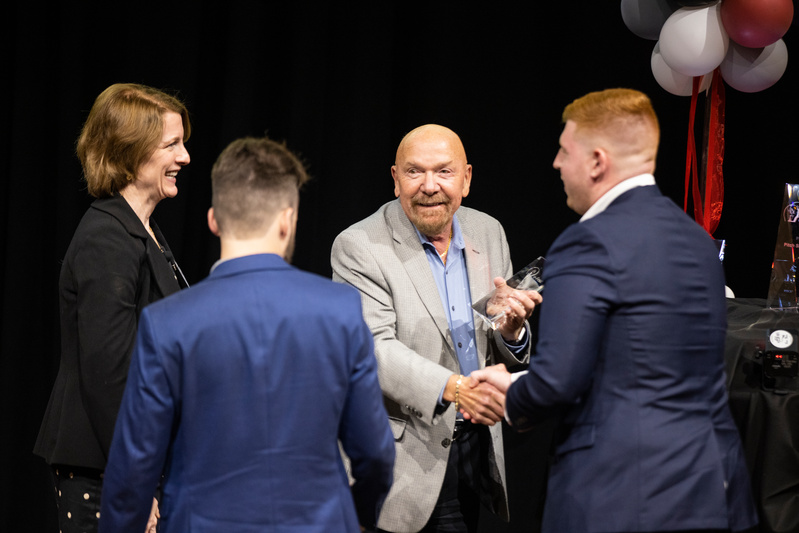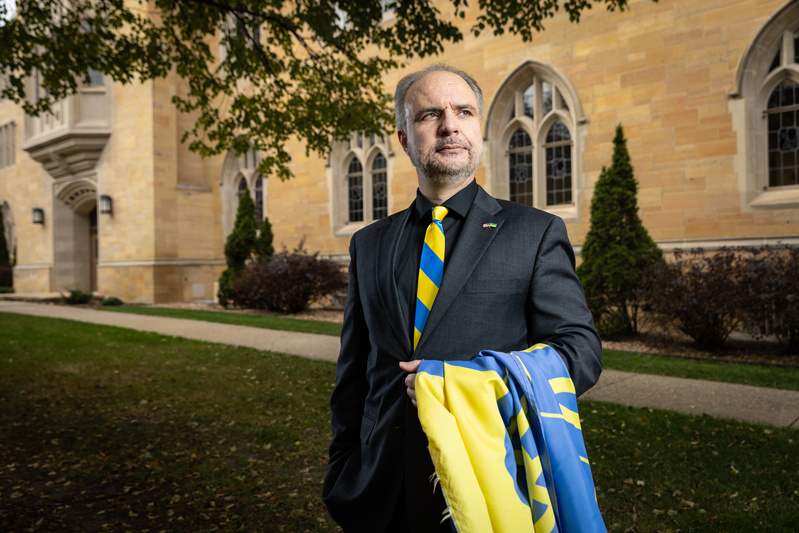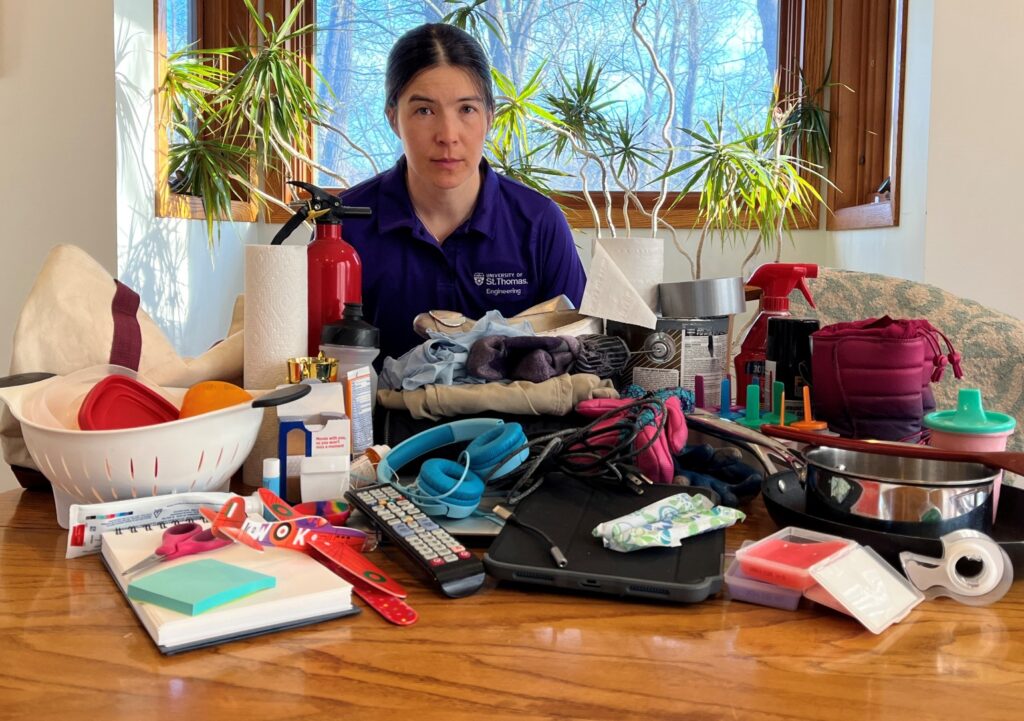Dick Schulze, Best Buy’s founder and chairman emeritus, remembers growing the retail chain by “trial and error,” without the benefit of a college education. Mike Dougherty remembers hoping for a second chance for a bachelor’s degree. Paul Karon remembers falling on hard times which meant working while attending evening classes.
If there’s a common thread among these benefactors of the University of St. Thomas, it’s remembering the obstacles that stood in their way as they pursued their dreams. Those memories drive their desire to remove barriers for students admitted to Minnesota’s largest private university.
The total gifts to the university this past year is perhaps an indication that desire is quite strong among all St. Thomas donors. Across all donors this year, the university received more than $20 million in gifts within just a few months. A few highlights:
- $5 million from Alfred A. Iversen and Family Foundation to fund the Schoenecker Center’s engineering high bay
- $2 million-plus donated by a record-breaking 2,787 members of the Tommie Network who participated in this fall’s Tommie Give Day 24-hour annual campaign
- $10 million anonymous gift to Dougherty Family College
- $3 million gift from Ron Fowler to support the Fowler Business Concept Challenge and other programs at Opus College of Business
- $1 million from Foundation 94 for the Schoenecker Center’s Robotics and Automation Laboratory
- $500,000 from the George Family Foundation to create the Whole-Person Health Initiative at the Morrison Family College of Health
“We are grateful for each and every donation,” Erik Thurman, vice president of University Advancement, said. “The bold vision of our 2025 Strategic Plan combined with leadership in our colleges, units and athletics – in addition to the outstanding experiences that students have each day with faculty and staff – create so many opportunities for philanthropists to make an impact.”
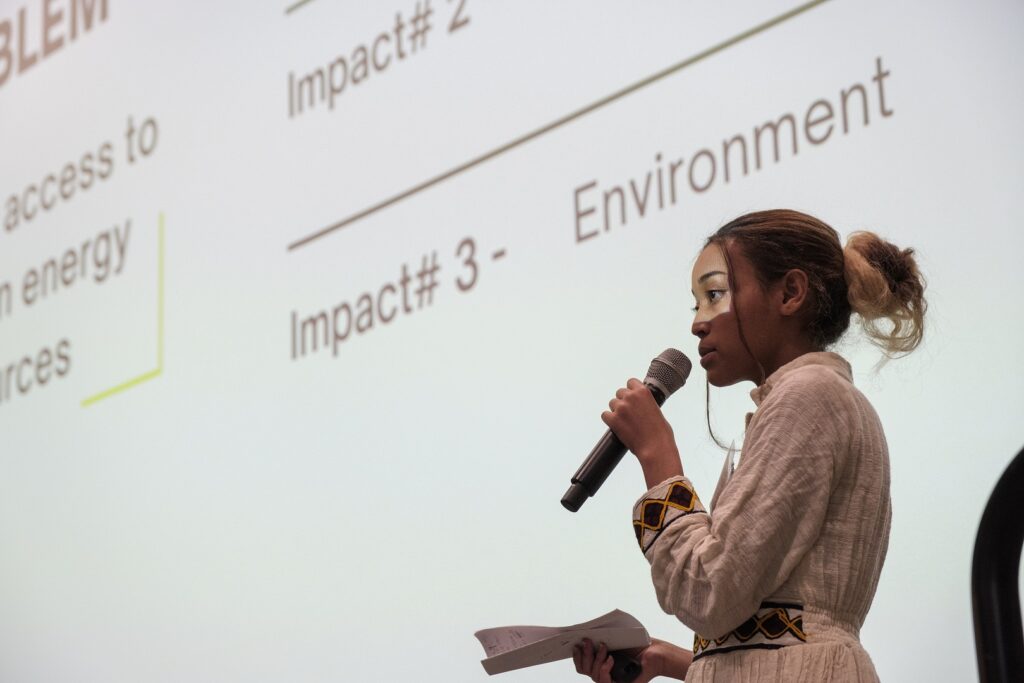
There are myriad reasons why someone gives financially to universities like St. Thomas, but it usually ties back to recognizing the value of a higher education, as well as the importance of breaking down the barriers to that value.
Take Schulze, for instance. As founding benefactor of the Schulze School of Entrepreneurship (and one of St. Thomas’ most prolific donors), the former Best Buy executive who remains one of the retailer’s largest shareholders isn’t shy about saying he never attended college, but wishes he had.
“I felt the thing that I was missing was a formal education and understanding of how to analyze the business,” he told Entrepreneur magazine in 2021.
“It was with that as a background that I said to myself, ‘Gee, if I could ever add any value to anybody else in this career path of growth that people aspire to, it’s the importance of education.’ It’s why I focused on helping to build and grow the Schulze School of Entrepreneurship at the university – providing those necessary tools for budding entrepreneurs to enhance their success.”
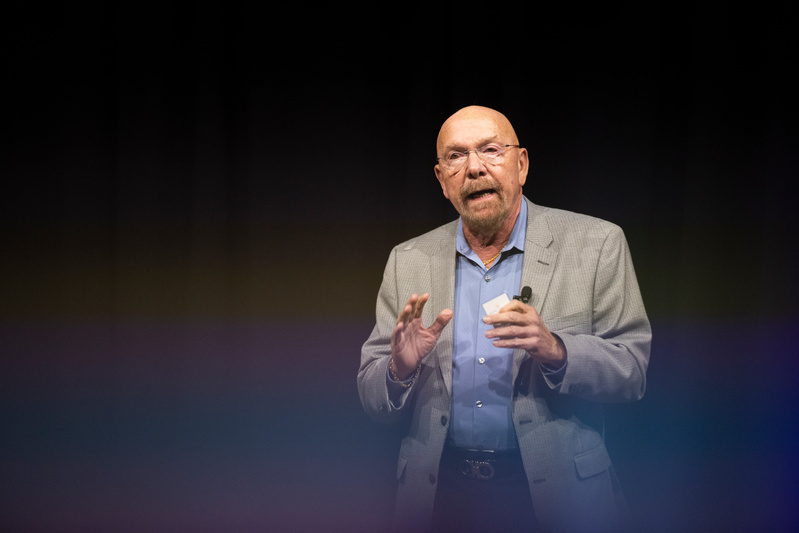
Today, the Schulze Innovation Scholarship, with matching funds identified by St. Thomas, provides full tuition for four years for students studying entrepreneurship.
“As a Schulze Innovation Scholar at St. Thomas, [the] scholarship has just unlocked the door to so many opportunities,” first-year student Sam Gausmann said. “If it wasn’t for the Schulze Foundation and the Schulze Innovation Scholarship, I don’t know if I would be here.”
Over the years, the success of students at the Schulze School has elevated the school itself. This year, the Schulze School of Entrepreneurship cracked the top 20 of the Princeton Review’s national ranking of entrepreneurship schools, landing at No. 18.
Removing barriers
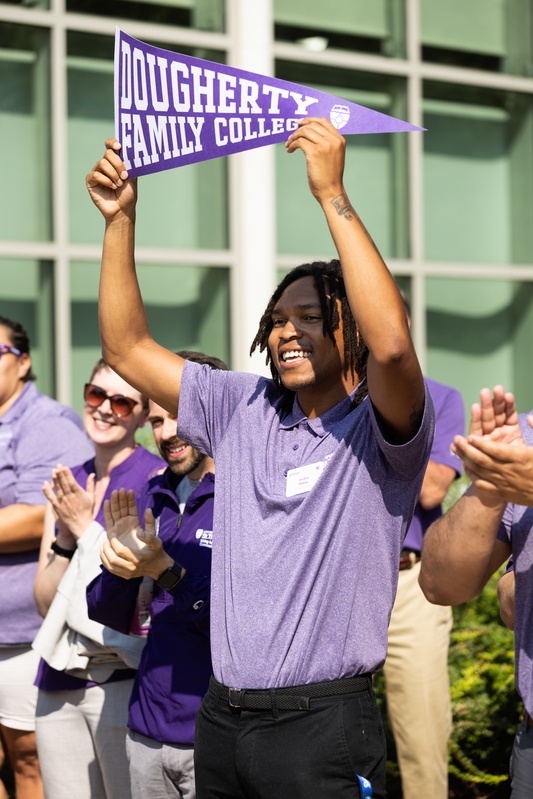
But rankings mean little if students lack access to those schools. To remove the barriers blocking attendance, donors funded nearly 2,900 scholarship awards for the 2022-23 academic year. That number includes established scholarships gifts made to Dougherty Family College, which provides students from historically underserved communities opportunities to earn associate degrees, and pathways to bachelor’s degrees. Because of philanthropic gifts, the average DFC student tuition is $1,030 per year.
In September, an unnamed donor committed $10 million to DFC’s endowment and challenged St. Thomas and its supporters to raise another $10 million by June. With $20 million added to the endowment, St. Thomas will close the education attainment gap for 300 DFC students per year, in perpetuity.
“The anonymous gift is definitely a blessing, and it shows how strongly people believe in our remarkable scholars, and in the hard work of our talented faculty and staff,” DFC Dean Buffy Smith said.
Gifts such as these show a belief in the vision of DFC’s namesakes, Michael and Kathy Dougherty, who in 2017 made strategic investments in students who can thrive in college but lacked the financial resources to attend many institutions.
Their motivation to give is quite similar to other major benefactors. Mike Dougherty ’66 had to leave Creighton University and the College of St. Thomas for academics and discipline; so he joined the Army where he learned self-responsibility. When he later applied for readmission to St. Thomas, the president and vice president agreed to give him a second chance.
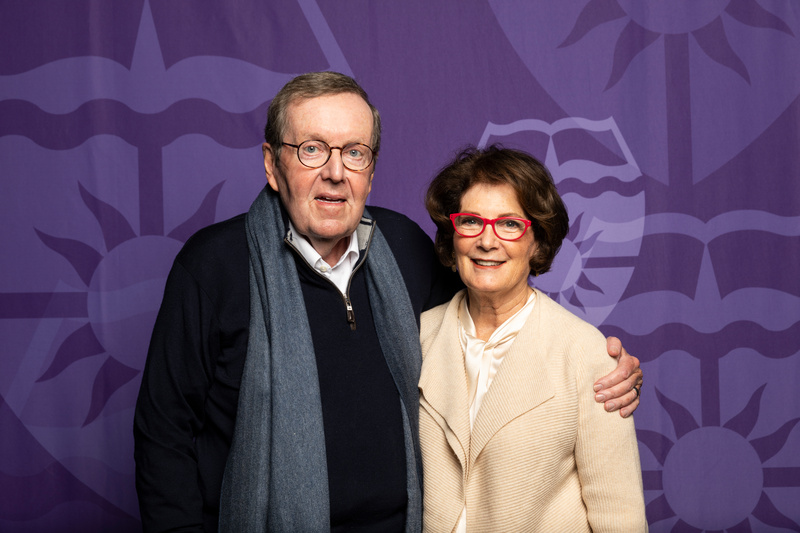
The belief that others had in Dougherty is paid forward in the form of scholarships to DFC students.
Also extended to DFC students is a scholarship earmarked for any transfer student from underrepresented populations continuing their education at St. Thomas’ Schulze School. A recent generous gift from Mark and Jodie Zesbaugh also funds programming and scholarships and will establish a social entrepreneurship incubator at the Schulze School that will connect students with mentors and resources to launch new ventures, and work with a resident entrepreneur mentor.
Smith points out that such investments ultimately benefit more than the scholars.
“The Twin Cities, and all of Minnesota, will be enriched as we remove structural barriers to opportunity,” Smith said. “DFC graduates are starting their careers in Minnesota and investing in our communities to make them stronger.”
Funding the future
Many donors remember the transformational opportunities they had while obtaining a higher education. Such was the case for Paul Karon ’85, who was a St. Thomas transfer student on scholarship, taking evening classes after his family had fallen on hard times. Karon remembers the personal challenges he faced trying to obtain an education, as well as the transformational opportunities he had along the way. Karon’s experience would shape the rest of his career, and his life.
As a result, Karon gives generously to St. Thomas to ensure veterans would have those same opportunities he had in life. This year, the Veterans Resource Center was named for Paul and his wife, Sarah.
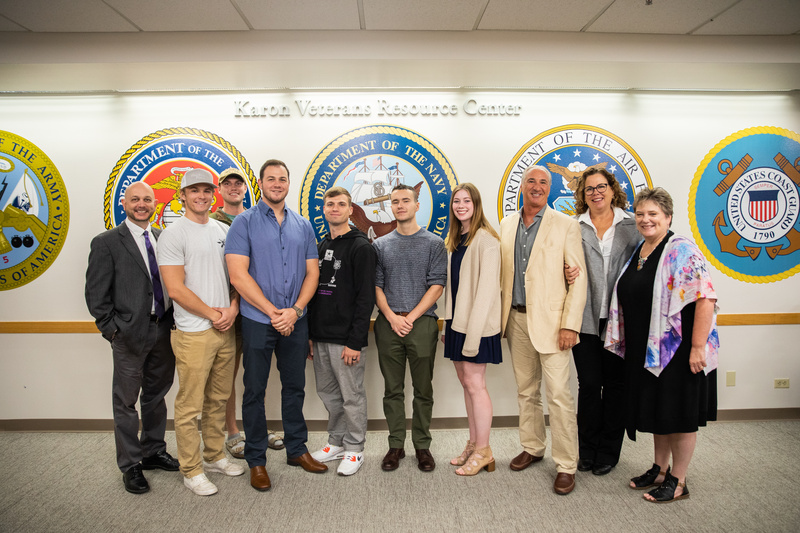
“The gratitude I have is for the country – who let someone go to night school and work their way up in a system to lead a large, complicated, multinational financial company. That doesn’t happen everywhere,” Karon said. “I don’t think my life experience would have been what it was [if I was] anywhere else than here. By close extension, that brings my gratitude to veterans.”
That commitment ensures veterans services at St. Thomas will be permanent. The couple also took a hands-on approach by traveling to the Pat Tillman Veterans Center at Arizona State University this fall with St. Thomas staff to gather ideas for best practices to adopt back home.
“The Karon Veterans Resource Center has been the light in the darkness of my transition to St. Thomas,” said Anna Sauter ’24, airman first class in the Minnesota Air National Guard. She joined St. Thomas during the COVID-19 pandemic when social distancing made it difficult to socialize and meet other students. “I have made my closest friends [here]. We can bring our military experiences into this part of our lives because we can all relate.”
Other donors make an impact directly in the classroom.
In May, for instance, the university received a $1 million gift from Henry and Angelena Blattner’s Foundation 94 to outfit a Robotics and Automation Laboratory at the Schoenecker Center, which is scheduled to open in 2024. Their funding for two robotic arms will be used by students for high-speed and high-load industrial applications, and the other will be used in coordination with human operators for tasks requiring precision, extra safety or heavy loads.
The Blattners announced they are pleased to donate to the building of the Schoenecker Center after seeing St. Thomas’ existing impressive engineering facilities, conveyed a sentiment about why they give that likely sums up every donor who gives to a St. Thomas area that has meaning to them: “for the opportunities it will provide to current and future Tommies.”
